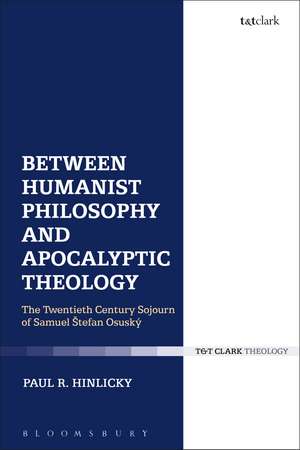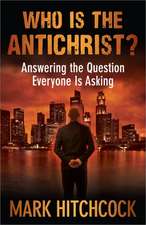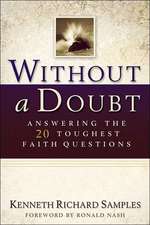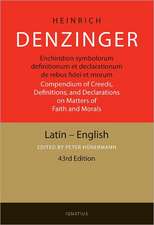Between Humanist Philosophy and Apocalyptic Theology: The Twentieth Century Sojourn of Samuel Stefan Osusky
Autor Dr Paul R. Hinlickyen Limba Engleză Paperback – 22 aug 2018
| Toate formatele și edițiile | Preț | Express |
|---|---|---|
| Paperback (1) | 236.74 lei 6-8 săpt. | |
| Bloomsbury Publishing – 22 aug 2018 | 236.74 lei 6-8 săpt. | |
| Hardback (1) | 773.14 lei 6-8 săpt. | |
| Bloomsbury Publishing – 15 iun 2016 | 773.14 lei 6-8 săpt. |
Preț: 236.74 lei
Preț vechi: 305.22 lei
-22% Nou
Puncte Express: 355
Preț estimativ în valută:
45.31€ • 46.70$ • 38.25£
45.31€ • 46.70$ • 38.25£
Carte tipărită la comandă
Livrare economică 01-15 martie
Preluare comenzi: 021 569.72.76
Specificații
ISBN-13: 9780567683816
ISBN-10: 0567683818
Pagini: 224
Dimensiuni: 156 x 234 mm
Greutate: 0.31 kg
Ediția:NIPPOD
Editura: Bloomsbury Publishing
Colecția T&T Clark
Locul publicării:London, United Kingdom
ISBN-10: 0567683818
Pagini: 224
Dimensiuni: 156 x 234 mm
Greutate: 0.31 kg
Ediția:NIPPOD
Editura: Bloomsbury Publishing
Colecția T&T Clark
Locul publicării:London, United Kingdom
Caracteristici
An example of a post-modern journey from philosophy to theology
Notă biografică
Paul R. Hinlicky is Tise Professor at Roanoke College in Virginia, USA, Docent of the Protestant Theological Faculty of Comenius University in Bratislava, Slovakia, and Professor of Systematic Theology at the Institute of Lutheran Theology, USA.
Cuprins
IntroductionChapter One: From Dissent under Imperialism to Nation BuildingChapter Two: Resistance to Fascism and the Turn to the BibleChapter Three: Speaking from the Scriptures to a World at WarChapter Four: Biblical Theology in SamizdatConclusionBibliographyIndex
Recenzii
[An] erudite intellectual biography ... This book exhumes [Osuský's] intellectual legacy. It does this by exhaustive analysis and by extensive summaries of his numerous writings, supplemented by situating him within the currents of Lutheran theology.
Slovakian intellectual Samuel Stefan Osusky lived through and reflected on the European disasters of the twentieth century, despite the threat of the Marxist-Leninist regime in Czechoslovakia to destroy his legacy. Here, Paul Hinlicky combats that erasure and relays Osusky's valuable story to an English-speaking audience. Only Hinlicky - a theologian of the highest order with high-ranging interests, mastery of the Slovak language, and a record of interrogating the place of philosophy and theology in the rise of fascism and bolshevism - could have written this welcome book.
Paul Hinlicky has done a signal service by unlocking the witness of the Slovak Lutheran theologian and bishop Samuel Stefan Osusky for a wider audience. Osusky faced two world wars, democracy, fascism and finally the communist regime that silenced him, moving gradually from the idealism he inherited to a more biblical and apocalyptic message. Hinlicky deftly traces this halting move from "apologetics" to "catechesis." illuminating Osusky's struggle to speak the authentic gospel to a church under fire. The history is fascinating and the lessons for the current church profound.
Paul Hinlicky has done great service by bringing the theological achievement of Osusky (1888-1976) onto the radar of English and American theologians and scholars. Hinlicky not only follows the intellectual journey of a Slovak theologian from liberalism to biblical theology but shows how Osusky resisted Fascism and Communism. Moreover, Hinlicky translates several key passages from Slovak into English, thereby letting Osusky speak for himself. This book fills a gap on the theological map of the 20th century.
Paul Hinlicky provides us here with an excellent theological endeavour into the world of widely gifted Osusky. Hinlicky brilliantly shows how Osusky enters into the dialogue of how to think critically about God, and thus encourages us to see the Austro-Hungarian born Slovak lawyer, diplomat, politician and university professor known even beyond his life's work.
In today's socio-political climate some might say Between Humanist Philosophy and Apocalyptic Theology is timely.
Slovakian intellectual Samuel Stefan Osusky lived through and reflected on the European disasters of the twentieth century, despite the threat of the Marxist-Leninist regime in Czechoslovakia to destroy his legacy. Here, Paul Hinlicky combats that erasure and relays Osusky's valuable story to an English-speaking audience. Only Hinlicky - a theologian of the highest order with high-ranging interests, mastery of the Slovak language, and a record of interrogating the place of philosophy and theology in the rise of fascism and bolshevism - could have written this welcome book.
Paul Hinlicky has done a signal service by unlocking the witness of the Slovak Lutheran theologian and bishop Samuel Stefan Osusky for a wider audience. Osusky faced two world wars, democracy, fascism and finally the communist regime that silenced him, moving gradually from the idealism he inherited to a more biblical and apocalyptic message. Hinlicky deftly traces this halting move from "apologetics" to "catechesis." illuminating Osusky's struggle to speak the authentic gospel to a church under fire. The history is fascinating and the lessons for the current church profound.
Paul Hinlicky has done great service by bringing the theological achievement of Osusky (1888-1976) onto the radar of English and American theologians and scholars. Hinlicky not only follows the intellectual journey of a Slovak theologian from liberalism to biblical theology but shows how Osusky resisted Fascism and Communism. Moreover, Hinlicky translates several key passages from Slovak into English, thereby letting Osusky speak for himself. This book fills a gap on the theological map of the 20th century.
Paul Hinlicky provides us here with an excellent theological endeavour into the world of widely gifted Osusky. Hinlicky brilliantly shows how Osusky enters into the dialogue of how to think critically about God, and thus encourages us to see the Austro-Hungarian born Slovak lawyer, diplomat, politician and university professor known even beyond his life's work.
In today's socio-political climate some might say Between Humanist Philosophy and Apocalyptic Theology is timely.













